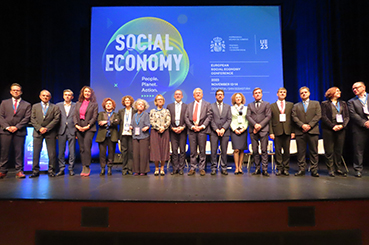From November 13 to 14, 2023, the High-Level Conference on social economy titled ‘People, Planet, Action’ took place in San Sebastian, the capital of the Social Economy for 2023. The event brought together 600 participants, including high representatives from EU governments and European institutions, key figures from the social economy sector, and international academic experts. The Conference concluded with the presentation of the ‘San Sebastian Manifesto,’ a document signed by representatives of 19 EU countries, the European Economic and Social Committee, the Committee of the Regions of the EU, and Social Economy Europe.
The opening ceremony of the Conference was attended by the European Commissioner for Employment and Social Rights, Nicolas Schmit, who emphasized that the future of the economy is at stake—a more sustainable economy that enhances resilience. The Commissioner argued that the social economy “guarantees innovation, prosperity, solidarity, and more cohesive societies that leave no one behind.”
Faced with major challenges for the EU, such as the war in Ukraine and the energy crisis, the conference highlighted the commitment to align the social economy with the progress of the European project and to overcome these crises. Significant conclusions were reached on strategic axes, including creating and ensuring highly qualified jobs for the social economy, contributing to the ecological and digital transitions, access to finance and markets, and attracting young people while promoting the visibility of the social economy.
Developing social economy across all areas
According to the latest available data, 2.8 million social economy entities operate in the European Union, employing 13.6 million people. This represents 6.3% of the EU’s workforce. The European Union’s social economy consists of various entities, including cooperatives, mutuals, associations, foundations, social enterprises, and other legal structures regulated by member states.
In recent years, the recognition of the social economy has continued to increase, as evidenced by the adoption, in April 2023, of the United Nations General Assembly Resolution ‘Promoting social and solidarity economy for sustainable development’; the European Social Economy Action Plan presented by the European Commission in December 2021; the ILO Resolution on decent work and social and solidarity economy of June 2022; and the OECD Recommendation on social and solidarity economy and social innovation of June 2022.
During the Spanish Presidency, the Council also adopted the first Council Recommendation on the framework conditions for the Social Economy, another significant step towards the consolidation and strengthening of the ecosystem.
Signing of the Manifesto
The Conference concluded with the signing of the San Sebastian Manifesto on the Social Economy, aiming to reinforce European-level policies advancing the sector in all countries in the region. 19 EU governments, along with the European Economic and Social Committee, the Committee of the Regions, and Social Economy Europe, signed the Manifesto, promoted by the Ministry of Labour and Social Economy.
With this Manifesto, the signing institutions and countries commit “to an ambitious roadmap for the social economy,” including support for each country’s adherence to UN, ILO, and European Commission resolutions.
They also call for the renewal of the Social Economy Intergroup of the European Parliament, a key cross-cutting group to ensure that European policies take into account all social economy entities.
The 19 signatory countries also commit to increasing the visibility of the social economy as a tool to promote collective entrepreneurship, encourage worker and citizen participation, innovation, and the inclusion of people at risk or exclusion.
They also commit to facilitating funding and market access for the social economy, mobilizing funds from the Recovery and Resilience Mechanism and other EU instruments, advancing towards greater recognition of socially responsible investments and public procurement, as well as other forms of participation by social economy organizations in the design and provision of services.
Basque and Spanish Experience
During the conference, the international audience also had the opportunity to learn about the Basque and Spanish experience in social economy through visits to companies and entities and discussions with representatives from the Basque and Spanish governments. They highlighted the Mondragon model alongside numerous other experiences.
They were informed of the initiatives approved in Spain since the approval of the Social Economy Law in 2011, along with successive state and territorial strategies. Secretary of State Joaquín Pérez Rey stated that the Ministry of Labour and Social Economy will continue to promote the social economy “as the best tool to combat climate crisis, inequalities, and erosion of democracy.” He explained that in Spain there are two key aspects that need to be developed further: the Comprehensive Law of Social Economy on one hand, and on the other, the expansion of social economy models to all enterprises, transferring democratic methods from social economy to the rest of the economy.
The next European Social Economy Conference will take place on February 12 and 13 in Liege, within the framework of the Belgian EU presidency.







